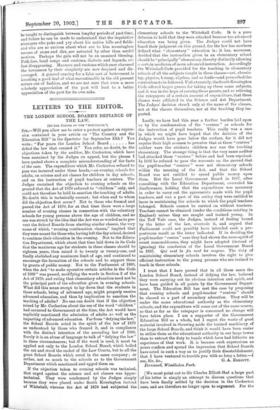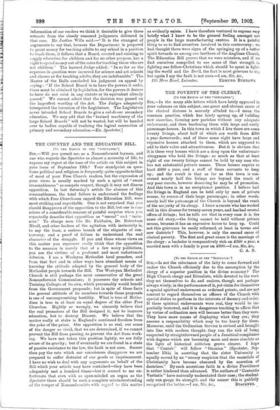LETTERS TO THE EDITOR.
THE LONDON SCHOOL BOARD'S DEFIANCE OF THE LAW.
[To THE EDITOR OP THE " SPECTATOR:I Srit,—Will you allow me to enter a protest against an expres- sion contained in your article on " The Country and the Education Bill" in the Spectator for September 13th ? You
write : " For years the London School Board has defied the law that created it." You refer, no doubt, to the objections taken by the auditor•, Mr. Cockerton, which have been sustained by the Judges on appeal, but the phrase I have quoted shows a complete misunderstanding of the facts of the case. The expenditure which Mr•. Cocker•ton refused to pass was incurred under three heads,—on evening schools for adults, on science and ar•t classes for children in day schools, and on the instruction of pupil teachers at centres. The Judges sustained the objection to evening schools on the ground that the Act of 1870 referred to " children " only, and could not therefore be held to sanction the teaching of adults. No doubt this is technically correct; but when and to whom did the objection first occur ? Not to those who framed and passed the Act of 1870, for at that time there were a large number of evening classes in connection with the voluntary schools for young persons above the age of children, and no one was struck by the idea that the Act was so worded as to pre- vent the School Boards from starting similar classes, the very name of which, "evening continuation classes," implied that they were meant for those who, having left the day school, desired to continue their education in the evening. Not to the Educa- tion Department, which about that time laid down in its Code that the maximum age for students in these classes should be eighteen years, then raised it to twenty or twenty-one, and finally abolished any maximum limit of age, and continued to encourage the formation of the schools and to support them by grants of public money. Not to the Parliament of 1890, when the Act "to make operative certain articles in the Code of 1890" was passed, modifying the words in Section 3 of the Act of 1870, and ruling that elementary education need not be the principal part of the education given in evening schools. What did this mean except to lay down that the students in these schools, being of advanced age, might properly receive advanced education, and thus by implication to sanction the teaching of adults? No one can doubt that if the objection raised by Mr. Cockerton about the use of the word "children" had occurred to Government at the time, the Act would have explicitly sanctioned the admission of adults as well as the imparting of advanced education. Far from "defying the law," the School Boards acted in the spirit of the law of 1870 as understood by those who framed it, and in compliance with the distinct intention of the amending law of 1890. Surely it is an abuse of language to talk of "defying the law" in these circumstances ; but if the word is used, it must be applied not only to the London School Board, which belled the cat and stood the racket of the Law Courts, but to all the great School Boards which erred in the same company ; or rather, not so much to the schools as to the Government Department which sanctioned and egged them on.
If the objection taken to evening schools was technical, that urged against the science and art classes was hyper- technicaL They were condemned by the Judges simply because they were placed under South Kensington instead of Whitehall, whereas the Act of 1870 had subjected the
elementary schools to the Whitehall Code. It is a pure delusion to hold that they were attacked because too advanced education was being given. The Judges could not have based their judgment on this ground, for the law has nowhere defined what " elementary " education is : it has, moreover, decided that the instruction given in an elementary school should be "principally" elementary, thereby distinctly allowing a certain modicum of more advanced instruction. Accordingly the Whitehall Code provided for the teaching in elementary schools of all the subjects taught in these classes—art, chemis- try, physics, botany, algebra, and so forth—and prescribed the curriculum to be followed. Unfortunately, the South Kensington Code offered larger grants for taking up these same subjects, and it was in the hope of earning those grants, and so relieving the ratepayers of a certain amount of expenditure, that these classes were affiliated to the Science and Art Department. The Judges' decision struck only at the name of the classes, not at the classes themselves, nor at the teaching they im- parted.
Lastly, we have had this year a further burden laid upon us by the condemnation of the " centres " or schools for the instruction of pupil teachers. This really was a case in which we might have hoped that the decision of the Judges would have gone below the surface, for it did not require their high acumen to perceive that at these " centres " neither were the students children nor was the teaching elementary. The strange thing is that the very same auditor had attacked these " centres " before and had been repulsed. In 1886 he refused to pass the accounts on the ground that the pupil-teacher " centres " were not elementary schools within the meaning of the Act, and that the School Board was not entitled to spend public money upon them. But the Local Government Board in 1887, after consulting with the Education Department, overruled his disallowance, holding that the expenditure was necessary in order to carry out the agreements made with the pupil teachers, and was a part of the outlay they were entitled to incur in maintaining the schools to which the pupil teachers belonged. Schools cannot be carried on without teachers. Teachers cannot be obtained (under the conditions existing in England) unless they are caught and trained young. In the Taff Vale case, the Judges, instead of feeling bound by the letter of the law, overrode it, and argued that Parliament could not possibly have intended such a pre- posterous result as the letter indicated. If in deciding the pupil-teacher• " centre" case they had shown the same spirit of sweet reasonableness, they might have adopted (instead of ignoring) the conclusion of the Local Government Board in 1887. Qui vent la fin vent Zes moyens. The duty of maintaining elementary schools involves the right to give efficient instruction to the young persons who are trained to teach in those schools.
I trust that I have proved that in all three cases the London School Board, instead of defying the law, believed they were carrying out its obvious intention and spirit, and have been guided in all points by the Government Depart- ment. The Education Bill has met the case by proposing that evening schools and pupil-teacher " centres " should be classed as a part of secondary education. They will be under the same educational authority as the elementary schools, and the expenditure will come out of the same source, so that as far as the ratepayer is concerned no change will have taken place. I am a, supporter of the Government Education Bill as a whole, but I regret the waste of good material involved in throwing aside the trained machinery of the large School Boards, and think it would have been easier to utilise them as the educational authority in our large towns than to entrust the duty to hands which have had hitherto no experience of that work. It is because such expressions as yours confirm and spread the impression that School Boards have acted in such a way as to justify their disestablishment, that I have ventured to trouble you with so long a letter.—I am, Sir, &c., C. A. Ersaorr. Fernwood, Wimbledon Park.
[We must point out to Sir Charles Elliott that a large part of his letter is simply an attempt to discuss questions that have been finally settled by the decision in the Cockerton case, and are therefore no longer open to argument. For the information of our readers we think it desirable to give three extracts from the closely reasoned judgments delivered in that case. Mr. Justice Wills said:—" It is the strangest of arguments to say that, because the Department is prepared to grant money for teaching adults to any school in a position to teach them, it follows that a Board, created and existing to supply education for children and for no other purpose, has a right to spend money out of the rates for teaching those who are not children." The learned Judge added : " In so far as the expenses in question were incurred for science and art schools and classes or for teaching adults, they are indefensible." The Master of the Rolls concluded his judgment on appeal by saying : " If the School Board is to have the powers it seeks, these must be obtained by legislation, for the powers it desires to have do not exist in any statute or its equivalent already passed." We cannot admit that the decision was passed on the imperfect wording of the Act. The Judges adequately interpreted the intention of the Legislature. The Legislature never intended School Boards to give a cul-de-sac secondary education. We may add that the "trained machinery of the large School Boards" will not be wasted, but will be handed over to bodies capable of 'realising the logical connection of primary and secondary education.—ED. Spectator.]







































 Previous page
Previous page